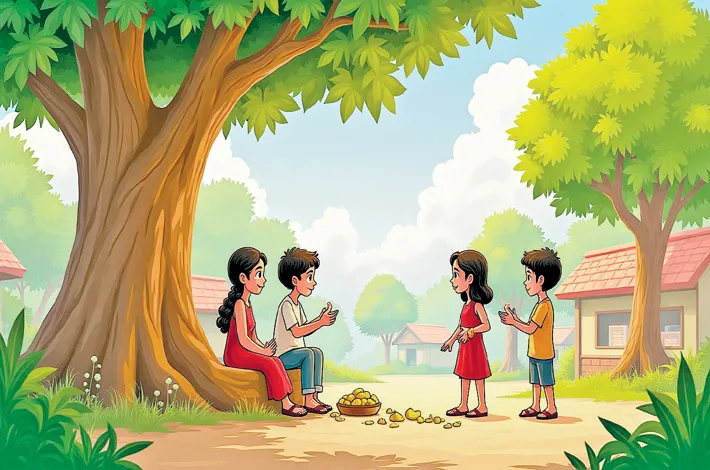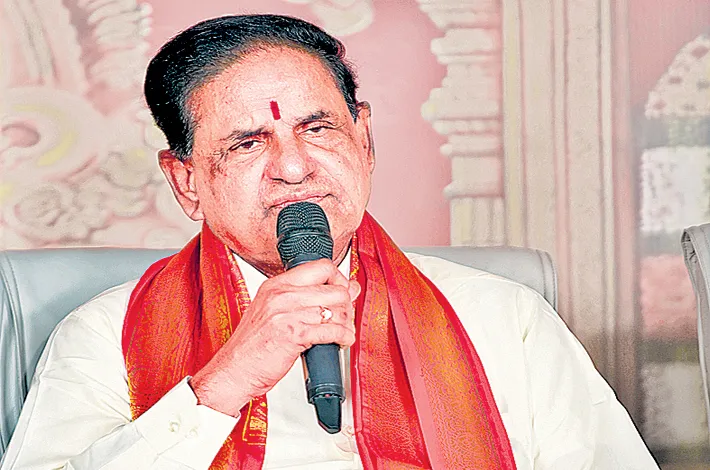The Civic Champions of Rampur
23-07-2025 12:00:00 AM

In the heart of Karnataka, nestled among rolling hills and swaying coconut palms, lay the village of Rampur. It was a place where the air smelled of jasmine and the mornings echoed with the chatter of sparrows. But Rampur had a problem—its lanes were littered with banana peels, plastic bags, and forgotten scraps, and its people often ignored the rules of living together kindly. That is, until five brave children—Maya, Malathi, Mahi, Neelam, and Venkatesh—decided to change things.
Maya, the leader, was a girl with sparkling eyes and a mind as sharp as a tack. At ten years old, she could outsmart anyone in a debate and had a laugh that made even the grumpiest buffalo smile. Malathi, her best friend, was the planner, always sketching ideas on scraps of paper. Mahi, the youngest at eight, was fearless, climbing trees to rescue kites or chase away stray dogs. Neelam, quiet but clever, could solve any puzzle, while Venkatesh, with his endless energy, could run from one end of Rampur to the other without breaking a sweat.
One sunny morning, the five friends sat under the giant banyan tree in the village square, munching on guavas. Maya frowned at a pile of wrappers near the tea stall. “Look at that mess!” she said. “If we don’t teach Rampur to care, our village will turn into a giant dustbin!”
“But how do we make people listen?” asked Neelam, pushing her glasses up her nose.
“We’ll show them,” said Maya, her eyes gleaming. “We’ll be the Civic Champions!”
The group sprang into action. Malathi drew a plan on a piece of bark: Step 1—Clean the village. Step 2—Teach the rules. Step 3—Make it fun! They started with the market street, where vendors tossed vegetable peels and shoppers dropped plastic bags. Armed with brooms and sacks, the children swept, picked, and sorted. Mahi, fearless as ever, climbed a lamppost to untangle a plastic sheet flapping in the wind. Venkatesh zoomed around, collecting trash faster than a monsoon wind. Neelam sorted the waste into piles—compost, recyclables, and landfill—while Malathi labeled them with colorful signs.
Villagers stopped to watch. “What are these kids up to?” grumbled Old Man Gowda, sipping his tea.
“We’re saving Rampur!” shouted Mahi, waving from the lamppost.
Maya stepped forward. “Uncle Gowda, if we keep throwing trash everywhere, our village will get sick. The cows eat plastic, the drains clog, and the air smells bad. We need civic sense!”
Gowda scratched his beard. “Civic sense? What’s that?”
“It’s about caring for our home,” said Neelam softly. “Like not littering, keeping water clean, and respecting each other.”
The children’s cleanup drew a crowd. Some laughed, but others joined in. By noon, the market street sparkled, and the pile of sorted waste was a colorful testament to their work. But Maya knew cleaning wasn’t enough—people had to learn.
For Step 2, the children organized a “Civic Mela” in the school courtyard. Malathi painted posters with slogans like “Keep Rampur Bright, Don’t Litter at Night!” and “Clean Today, Happy Tomorrow!” Venkatesh ran from house to house, inviting everyone. Neelam set up a stall explaining how to compost kitchen waste, using a model she’d made from clay and twigs. Mahi performed a skit, pretending to be a sad river choked with plastic, while Maya narrated.
At first, the villagers were skeptical. “Why should we bother?” asked Lakshmi Aunty, who ran the sweet shop. “Trash has always been there.”
Maya stood on a bench, her voice clear. “Aunty, imagine your shop covered in garbage. Would customers come? If we all work together, Rampur can be the cleanest village in Karnataka!”
The skit made people laugh, and Neelam’s compost stall fascinated the farmers. Venkatesh handed out seed packets, promising that clean soil would grow better crops. Slowly, the villagers began to nod.
Step 3 was the trickiest—making civic sense fun. The children turned it into a game. They divided Rampur into four zones and challenged each to stay the cleanest. Mahi designed a scoreboard from old wood, and every week, the children inspected the zones. The winning zone got a prize—a basket of mangoes or a free puppet show by the kids. Venkatesh led “Trash Treasure Hunts,” where kids competed to collect the most litter. Malathi taught the younger children songs about keeping Rampur clean, and soon, the tunes echoed through the fields.
One day, a big test came. The monsoon rains arrived, and the village’s main drain, often clogged with trash, threatened to flood the market. The Civic Champions rushed to the scene. Mahi waded into the muddy water, pulling out bottles and bags. Neelam and Malathi organized a chain of kids to pass the debris to dry land. Venkatesh ran to fetch the adults, and Maya rallied everyone with her megaphone voice: “This is our village! Let’s save it!”
The villagers, inspired by the children’s courage, joined in. Old Man Gowda rolled up his dhoti and helped clear the drain. Lakshmi Aunty brought hot vadas for the workers. By evening, the drain was clear, and the market was saved. The crowd cheered, and Maya’s heart swelled.
Word of Rampur’s transformation spread. A newspaper reporter came, snapping photos of the children and their sparkling village. The article called them “The Civic Champions of Rampur,” and Maya’s gang beamed with pride. But the real reward was seeing Rampur change. People stopped littering, started composting, and even planted flowers along the lanes. The village well, once murky, ran clear again, and the cows no longer chewed on plastic.
One evening, under the banyan tree, the five friends sat together, tired but happy. “We did it,” said Malathi, sketching a new plan for a village library.
“Not yet,” said Maya, grinning. “There’s always more to do. But we’ve shown Rampur what civic sense means.”
Mahi tossed a guava in the air. “And it was fun!”
Neelam adjusted her glasses. “The numbers prove it—trash is down 70%!”
Venkatesh raced around the tree, shouting, “We’re the champions!”
As the sun set, painting the sky orange, the children laughed, their voices blending with the breeze. Rampur wasn’t perfect, but it was home—and thanks to Maya, Malathi, Mahi, Neelam, and Venkatesh, it was a home they were all proud to share.








